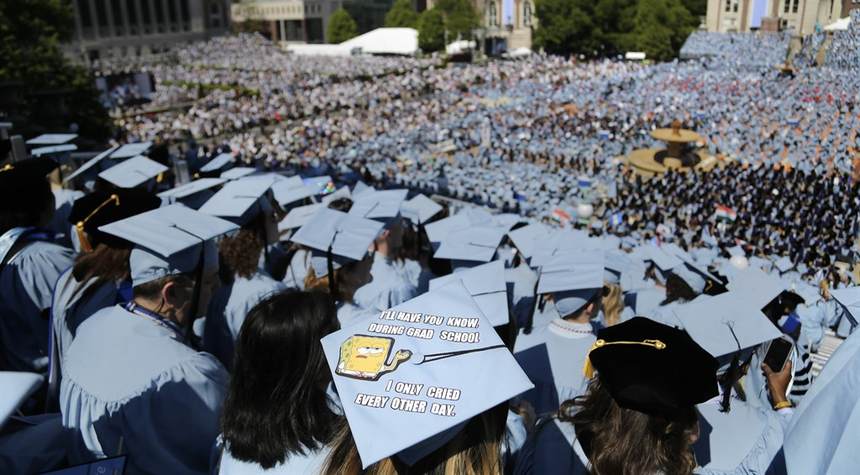The Cost of Student Loan Cancelation Would Be Higher Inflation, Say Experts

There are many principles involved in canceling all or part of the $1.4 trillion in student loan debt, not the least of which is the moral hazard in forgiving debts freely assumed. But since the words “leftist” and “moral” rarely roll off the tongue in the same sentence, there are other principles involved that make forgiving student loan debt a terrible idea.
There is the question of fairness. Most of that student loan debt is being held by graduates more than able to pay it back.
The Hill reports that “The field with the most loan forgiveness per borrower is dentistry, where the average borrower would offload $250,000 of debt onto taxpayers. Borrowers in the field of medicine would have an average of $174,000 forgiven. And borrowers in law would have an average of $119,000 forgiven.”
The moral hazard and the unfairness of student loan forgiveness pale in comparison to the practical reason not to forgive the debt: several experts point to the likelihood that inflation would get a boost with student loan forgiveness.
Maya MacGuineas, president of the Committee for a Responsible Federal Budget (CRFB), says that “debt cancellation may be an extremely appealing political talking point, but it is not good policy.”
“It is costly, inflationary, poorly targeted, and fails to address the root problems in our higher education financing system,” MacGuineas said in a statement Thursday. “Full debt cancellation would be a massive hand-out to rich doctors and lawyers, would worsen our inflation crisis, and would cost almost as much as the entire 2017 tax cuts.”
“Even partial debt cancellation would be costly, regressive, and inflationary,” she continued. “Forgiving $10,000 per person of debt would cost as much as universal pre-K or a full extension of the expanded ACA subsidies.”
“Either the President is serious about reducing deficits and getting inflation under control, or he is not. The White House can’t have it both ways,” MacGuineas added. “We need to be focusing on a serious and effective agenda that prioritizes sound policies, not poorly targeted political giveaways.”
Student loan debt is an easy target for far-left radicals like Senator Elizabeth Warren. But she’s playing a shell game with the economy in proposing it.
Do any Democrats ask what the inflationary impact would be of canceling hundreds of millions of dollars in student loans?
Noah Weinrich, a spokesperson for Heritage Action, the campaign-side sister organization to conservative think tank the Heritage Foundation, told Fox News Digital that canceling student debt “would raise inflation by up to 20%.”
“Make no mistake: this is a handout to wealthy, educated voters that will come at the expense of higher prices for food, gas, and energy for working American families who won’t see a dime of relief — not to mention higher taxes,” he continued. “This is an absurd election-year gimmick that punishes most Americans.”
Manhattan Institute senior fellow Brian Riedl was less emphatic about the inflationary impact of canceling the debt. He thinks its impact on inflation would be negligible. But that doesn’t make it good policy.
“The problems with student loan forgiveness are that the policy would transfer these liabilities over to the taxpayers (raising deficits and ultimately taxes), disproportionately benefit upper-income attorneys and doctors, and also send a signal to current and future college students that they should borrow even more on the expectation of future loan forgiveness programs,” he added.
That’s it, exactly. Unless there is massive, radical reform of student loan programs — not just the major programs like Pell Grants and Sallie Mae — we’re going to be right back where we started 20 years from now.
And radical lefties — maybe Senator Warren’s kid — will once again be blaming the crisis on greedy bankers and the rich.
